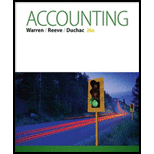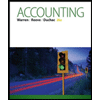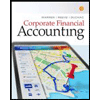
Accounting (Text Only)
26th Edition
ISBN: 9781285743615
Author: Carl Warren, James M. Reeve, Jonathan Duchac
Publisher: Cengage Learning
expand_more
expand_more
format_list_bulleted
Question
Chapter 15, Problem 15.3APE
To determine
Equity investments: Equity investments are stock instruments which claim ownership in the investee company and pay a dividend revenue to the investor company.
Equity method: Equity method is the method used for accounting equity investments which claim a significant influence of above 20% but less than 50% in the outstanding stock of the investee company.
Debit and credit rules:
- Debit an increase in asset account, increase in expense account, decrease in liability account, and decrease in
stockholders’ equity accounts.
- Credit decrease in asset account, increase in revenue account, increase in liability account, and increase in stockholders’ equity accounts.
To journalize: The stock investment transactions for Company P, under the equity method
Expert Solution & Answer
Want to see the full answer?
Check out a sample textbook solution
Students have asked these similar questions
Trial Balance
Rocky Mountain Tours Co. is a travel agency. The nine transactions recorded by Rocky Mountain Tours during June 20Y2, its first month of operations, are
indicated in the following T accounts:
Cash
(1) 40,000 (2) 4,000
(7) 13,100 (3) 5,000
(4) 6,175
(6) 6,000
(9) 1,500
Equipment
(3) 15,000
Dividends
(9) 1,500
Accounts Receivable
Accounts Payable
Service Revenue
(5) 20,500 (7) 13,100
(6) 6,000 (3) 10,000
(5) 20,500
Supplies
(2) 4,000 (8) 2,200
Common Stock
Operating Expenses
(1) 40,000
(4) 6,175
(8) 2,200
Q1:
Wyatt Company had three intangible assets at the end of 2024 (end of the fiscal year):
Computer software and Web development technology purchased on January 1, 2024, for $70,000. The technology is expected to have a useful life of four years.
A patent purchased from R. Jay on January 1, 2024 for a cash cost of $6,000. Jay had registered the patent with the Canadian Intellectual Property Office seven years earlier on January 1, 2017. The cost of the patent is amortized over its legal life.
A trademark that was internally developed and registered with the Canadian government for $13,000 on November 1, 2023. Management decided that the trademark has an indefinite life.
Required:
1. What is the acquisition cost of each intangible asset?
tech 70k
patent 6k
trademark 13k
2. Compute the amortization of each intangible asset at December 31, 2024. The company does not use contra accounts. (Round the final answers to the nearest whole dollar.)
tech 17.5k
patent: ????
3-a.…
Q1:Wyatt Company had three intangible assets at the end of 2024 (end of the fiscal year):
Computer software and Web development technology purchased on January 1, 2024, for $70,000. The technology is expected to have a useful life of four years.
A patent purchased from R. Jay on January 1, 2024 for a cash cost of $6,000. Jay had registered the patent with the Canadian Intellectual Property Office seven years earlier on January 1, 2017. The cost of the patent is amortized over its legal life.
A trademark that was internally developed and registered with the Canadian government for $13,000 on November 1, 2023. Management decided that the trademark has an indefinite life.
Required:
1. What is the acquisition cost of each intangible asset?tech 70kpatent 6ktrademark 13k
2. Compute the amortization of each intangible asset at December 31, 2024. The company does not use contra accounts. (Round the final answers to the nearest whole dollar.)tech 17.5k
patent: ????
3-a. Compute the amount of…
Chapter 15 Solutions
Accounting (Text Only)
Ch. 15 - Why might a business invest cash in temporary...Ch. 15 - What causes a gain or loss on the sale of a bond...Ch. 15 - When is the equity method the appropriate...Ch. 15 - How does the accounting for a dividend received...Ch. 15 - Prob. 5DQCh. 15 - What is the major difference in the accounting for...Ch. 15 - Prob. 7DQCh. 15 - How would a debit balance in Unrealized Gain...Ch. 15 - What are the factors contributing to the trend...Ch. 15 - Prob. 10DQ
Ch. 15 - Prob. 15.1APECh. 15 - Bond investment transactions Journalize the...Ch. 15 - Prob. 15.2APECh. 15 - Stock investment transactions On September 12,...Ch. 15 - Prob. 15.3APECh. 15 - Prob. 15.3BPECh. 15 - Prob. 15.4APECh. 15 - Prob. 15.4BPECh. 15 - Prob. 15.5APECh. 15 - Prob. 15.5BPECh. 15 - Prob. 15.6APECh. 15 - Prob. 15.6BPECh. 15 - Prob. 15.1EXCh. 15 - Prob. 15.2EXCh. 15 - Prob. 15.3EXCh. 15 - Prob. 15.4EXCh. 15 - Prob. 15.5EXCh. 15 - Entries for investment in stock, receipt of...Ch. 15 - Prob. 15.7EXCh. 15 - Prob. 15.8EXCh. 15 - Entries for stock investments, dividends, and sale...Ch. 15 - Prob. 15.10EXCh. 15 - Prob. 15.11EXCh. 15 - Prob. 15.12EXCh. 15 - Prob. 15.13EXCh. 15 - Prob. 15.14EXCh. 15 - Prob. 15.15EXCh. 15 - Prob. 15.16EXCh. 15 - Fair value journal entries, trading investments...Ch. 15 - Prob. 15.18EXCh. 15 - Prob. 15.19EXCh. 15 - Prob. 15.20EXCh. 15 - Prob. 15.21EXCh. 15 - Prob. 15.22EXCh. 15 - Prob. 15.23EXCh. 15 - Prob. 15.24EXCh. 15 - Prob. 15.25EXCh. 15 - Prob. 15.26EXCh. 15 - Prob. 15.27EXCh. 15 - Prob. 15.28EXCh. 15 - Prob. 15.29EXCh. 15 - Prob. 15.1APRCh. 15 - Prob. 15.2APRCh. 15 - Stock Investment transaction, equity method and...Ch. 15 - Prob. 15.4APRCh. 15 - Prob. 15.1BPRCh. 15 - Prob. 15.2BPRCh. 15 - Stock investment transactions, equity method and...Ch. 15 - Prob. 15.4BPRCh. 15 - Selected transactions completed by Equinox...Ch. 15 - Benefits of fair value On July 16, 1998, Wyatt...Ch. 15 - International fair value accounting International...Ch. 15 - Prob. 15.3CPCh. 15 - Warren Buffett and "look-through" earnings...Ch. 15 - Prob. 15.5CP
Knowledge Booster
Similar questions
arrow_back_ios
SEE MORE QUESTIONS
arrow_forward_ios
Recommended textbooks for you
 Intermediate Accounting: Reporting And AnalysisAccountingISBN:9781337788281Author:James M. Wahlen, Jefferson P. Jones, Donald PagachPublisher:Cengage Learning
Intermediate Accounting: Reporting And AnalysisAccountingISBN:9781337788281Author:James M. Wahlen, Jefferson P. Jones, Donald PagachPublisher:Cengage Learning Accounting (Text Only)AccountingISBN:9781285743615Author:Carl Warren, James M. Reeve, Jonathan DuchacPublisher:Cengage Learning
Accounting (Text Only)AccountingISBN:9781285743615Author:Carl Warren, James M. Reeve, Jonathan DuchacPublisher:Cengage Learning Corporate Financial AccountingAccountingISBN:9781305653535Author:Carl Warren, James M. Reeve, Jonathan DuchacPublisher:Cengage Learning
Corporate Financial AccountingAccountingISBN:9781305653535Author:Carl Warren, James M. Reeve, Jonathan DuchacPublisher:Cengage Learning College Accounting, Chapters 1-27AccountingISBN:9781337794756Author:HEINTZ, James A.Publisher:Cengage Learning,
College Accounting, Chapters 1-27AccountingISBN:9781337794756Author:HEINTZ, James A.Publisher:Cengage Learning,

Intermediate Accounting: Reporting And Analysis
Accounting
ISBN:9781337788281
Author:James M. Wahlen, Jefferson P. Jones, Donald Pagach
Publisher:Cengage Learning

Accounting (Text Only)
Accounting
ISBN:9781285743615
Author:Carl Warren, James M. Reeve, Jonathan Duchac
Publisher:Cengage Learning

Corporate Financial Accounting
Accounting
ISBN:9781305653535
Author:Carl Warren, James M. Reeve, Jonathan Duchac
Publisher:Cengage Learning

College Accounting, Chapters 1-27
Accounting
ISBN:9781337794756
Author:HEINTZ, James A.
Publisher:Cengage Learning,
